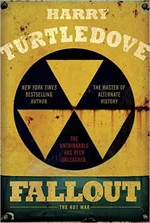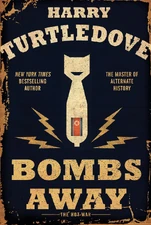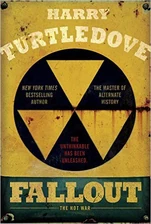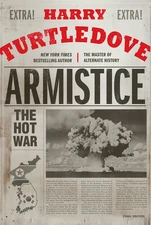| Fallout | |
|---|---|
 | |
| Author | Harry Turtledove |
| Cover artist | Dmitri Ezepov |
| Series | The Hot War |
| Genre(s) | Alternate history |
| Publisher | Del Rey |
| Publication date | July 19, 2016 |
| Preceded by | Bombs Away |
| Followed by | Armistice |
Fallout is the second volume in Harry Turtledove's The Hot War series. It was released on July 19, 2016.
Fallout begins in June 1951, in the aftermath of the atomic bombing of Paris, and ends in May 1952. The Soviet Union and its allies advance through West Germany in spite of heavy resistance from NATO forces. As the Red Army and its allies are on the verg of reaching the German border with the Netherlands, President Harry Truman and Defense Secretary George Marshall decide that their only remaining option to attack Soviets' forward positions on the east banks of the Rhine, sacrificing cities in West Germany in order to save Western Europe. Truman and Marshall speculate that, due to their much smaller nuclear arsenal, the Soviet Union will most likely retaliate by attacking more European cities. Although Truman expresses concern that the Soviets will attack the cities on the East Coast of the United States, Marshall assures him that this is impossible, as Soviet bombers cannot carry enough fuel to reach that far.
The American nuclear strikes in West Germany are largely successful, as they devastate the Soviet Unions frontlines and inflict massive losses on their best units. Consequently, the Red Army is forced to begin a tactical retreat, allowing the allies to push the front eastward. Following the attacks, Truman makes a public announcement calling for both sides to pull their forces back to the 1950 borders and declare the war a draw. However, Stalin refuses and vows to continue the war.
In retaliation,the Soviets attack American forces in South Korea, wiping out Pusan. This, in addition to the earlier destruction of the all of major ports of the U.S. West Coast and the Panama Canal, leaves he American situation in Korea desperate, forcing Truman to consider launching more nuclear strikes against the Chinese, and possibly attempt to kill Mao. The Soviets also destroy Antwerp, Belgium, which had served as a major logistical base for the allied war effort.
Both powers start suffering internal problems. Truman, tired of the mounting criticism from the Republican Party, and Senator Joseph McCarthy in particular, and the overwhelmed by the stress of the war, announces he will not run for re-election in 1952. For the Soviets, armed uprisings in Hungary and Slovakia against the Communist governments flame up. Stalin responds by ordering the city of Bratislava carpet-bombed. The Soviet Union's manpower situation becomes further strained by the massive losses sustained in the war, leading to speculation that senior members of the Communist party may have to be drafted.
In May, 1952, Stalin strikes back against the United States with horrifying results. After secretly developing the ability to refuel their bombers in-flight, the Soviets launch an attack on the American East Coast, catching the United States completely off-guard. The cities of New York, Boston and Washington are all devastated in the attacks; the two atomic bombs dropped on the capital kill most of Truman's cabinet and the senior staffs of most of the federal departments. So many Senators and Congressmen are killed that neither legislative branch can hold a quorum. Most of the candidates seeking the presidency, including Joseph McCarthy, Robert Taft, Hubert Humphrey, Estes Kefauver and W. Averell Harriman, are killed as well. Truman, who happened to be in Buffalo, New York on the date of the attack, survives, but he soon learns that the White House has been vaporized and that his wife and daughter are dead. The Pentagon is also destroyed in the attack, killing Secretary Marshall and much of America's military leadership. In New York City, most of the city's skyscrapers are destroyed. Philadelphia, America's third largest city, is spared when the assigned Soviet bomber crashes outside the city.
After coming to grips with the full extent of the destruction, and being advised by Supreme Chief Court Justice Fred Vinson (who, along with six of the eight associate Supreme Court justices, were not in Washington during the attacks) that he can temporarily assume control of the American government, Truman vows that he will make Stalin pay.
The novel ends with the United States launching another series of nuclear strikes against the Soviet Union's remaining population centers; Murmansk and Odessa are among the cities destroyed in the American counterattack. These attacks, combined with a large revolt in Poland, further drains the resources of the still retreating Red Army.
| |||||||||||||||||||||


